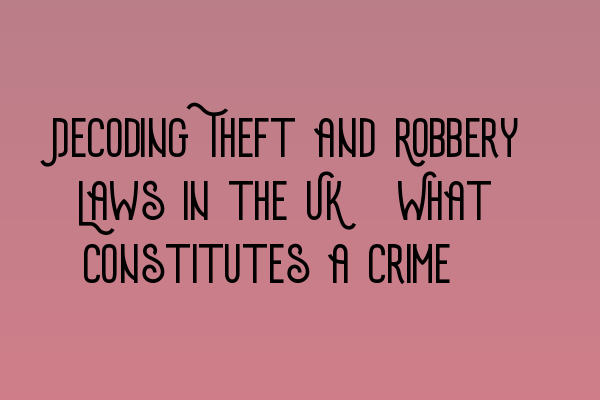Decoding Theft and Robbery Laws in the UK: What Constitutes a Crime?
Understanding theft and robbery laws in the UK is essential for individuals in various professions, including solicitors, law enforcement officers, and even the general public. Theft and robbery are both serious crimes that can lead to severe penalties, including imprisonment and fines. In this blog post, we will dive into the nuances of theft and robbery laws in the UK and discuss what actions constitute these crimes.
Theft Laws in the UK
Theft is defined as the act of dishonestly appropriating property belonging to another person, with the intention to permanently deprive the owner of that property. This can include various actions such as taking someone’s belongings without their permission or using deception to obtain valuable items.
According to UK law, theft is a criminal offense under the Theft Act 1968. It is important to note that theft can be committed in a wide range of circumstances, including theft from a person, theft from a shop, and theft from a vehicle.
In order to prove that a theft has taken place, the prosecution must establish the following elements:
- Appropriation: The defendant must have appropriated the property in question, meaning they have assumed the rights of the owner.
- Property: The property that has been taken must belong to someone else.
- Dishonesty: The defendant must have acted dishonestly in appropriating the property, without the owner’s consent.
- Intention to permanently deprive: The defendant must have the intention to permanently deprive the owner of the property.
It is crucial for individuals to understand these elements to effectively defend themselves against theft charges or to build strong cases if they are the victims of theft.
Robbery Laws in the UK
Robbery is an aggravated form of theft and is considered a more serious offense under UK law. It involves the use or threat of force to steal property from someone else. Robbery is governed by the Theft Act 1968, and individuals convicted of robbery can face significantly harsher penalties.
To establish a charge of robbery, the prosecution must prove the following elements:
- Theft: The defendant must have dishonestly appropriated property belonging to another person.
- Force or threat of force: The defendant must have used force or the threat of force to steal the property.
- Immediate force: The force used or threatened must be immediate and not merely a future possibility.
- Intention to permanently deprive: Just like in theft cases, the defendant must have the intention to permanently deprive the owner of the property.
It is important to note that the use of force in robbery cases can range from physical violence to the threat of violence or the use of weapons. The severity of the force used can impact the sentence imposed by the court if the defendant is convicted.
Now that we have explored the definitions and elements of theft and robbery laws in the UK, it is evident that these crimes carry significant consequences. If you are facing theft or robbery charges, it is essential to seek legal representation to ensure your rights are protected and to build a strong defense.
At SQE Criminal Law & Practice Law UK, our team of solicitors is well-versed in theft and robbery laws and can provide expert advice and representation. Contact us today to schedule a consultation and understand your legal options.
Related Articles:
- SQE 1 Practice Exam Questions
- SQE 1 Practice Mocks FLK1 FLK2
- SQE 2 Preparation Courses
- SQE 1 Preparation Courses
- SRA SQE Exam Dates
